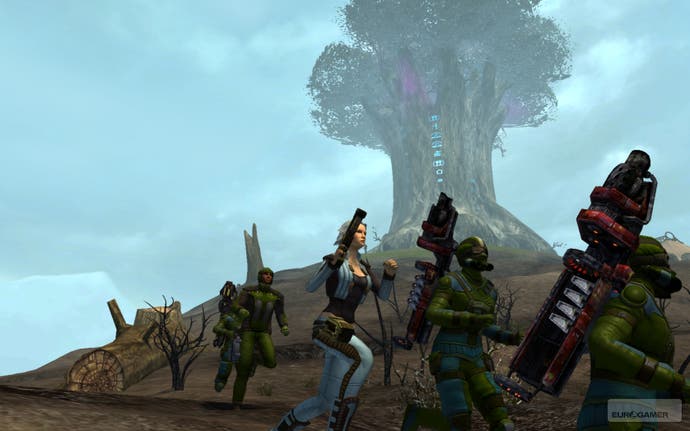Tabula Rasa
No longer a blank slate.
Over the course of writing the first draft of this feature, we discovered something fairly pertinent - there's a fine line between a re-review and an autopsy. Eurogamer's recent re-appraisal of World of Warcraft (conclusion: still stealing our lives) was a re-review: the subject is most certainly still alive and well.
Today's piece, sadly, feels more like an autopsy. Tabula Rasa isn't cold on the slab, but it's certainly heading that way. Much as it pains us - this is a young game, full of potential, and seemingly struck down before it had a chance to blossom - this article is going to end up being about piecing together the final hours, establishing the suspects and motives, and making those cruel incisions to examine the damage to the internal organs. CSI: Internet.
Ringing in the Changes
Of course, there will be those who decry the suggestion that TR is a dying game - and we wish we could count ourselves among them, we really do. We began our last article on TR by saying that there's a lot to love about the game, and we still firmly believe that in spite of a mis-managed launch and some shockingly poor design decisions, TR still essentially has the best combat, and some of the most interesting missions and zones, of any MMO we've played.
There are many, many moments on the trek up through the levels which remind you that Richard Garriott and his team are uniquely experienced and superbly talented at making online videogames. The combined arms weapon class system makes you think carefully about things like range, stance, cover and enemy type on the fly, turning each encounter into a fast-paced and rapidly changing scenario. The clones, which carry over your XP and talent points to freshly created alternative characters, not to the mention XP multipliers which reward you for pushing your character close to the edge in combat, almost entirely eliminate dull grinding from the game - an ethos which carries over to transport, with teleports available from the outset to eliminate long runs.

That's even before you consider the vast impact of the decision to make each zone into a true battleground, rather than simply a static area full of infinitely respawning local wildlife that needs killing. Tabula Rasa creates genuine hot zones - areas where you dodge and run through battles for supremacy, roads and pathways that suddenly become battlegrounds when enemy troops beam down en masse from dropships.
This finds its ultimate expression in the constant, ongoing sieges of bases and control points - waves and waves of enemies which genuinely threaten to overrun the base, rendering it unusable by players until a concerted effort wins it back. These aspects of Tabula Rasa are excellent. They create a game which is faster, more exciting and more dynamic than anything else in the MMORPG genre.
Yet it's also, by many accounts, a commercial disaster. Server populations are low, there was talk of guilds defecting from the game within months of launch, and despite a strong denial from publishers NCsoft, a Korean newspaper piece slamming the game as an expensive failure for the firm elicited a nod-and-wink "no smoke without fire" response from many quarters.
In public, NCsoft remains completely supportive of Tabula Rasa - dedicated to a programme of ongoing improvement and upgrades, and even to an expansion pack down the line. Privately, however, the company must be asking itself where it all went wrong.



